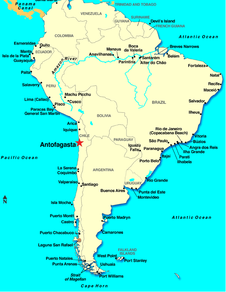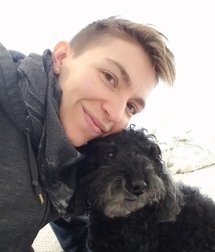 Hola! I’m Amanda Keller, a first-year PhD student in Molecular Toxicology with an emphasis on environmental exposure health. At the end of April, I will fly to the Atacama Desert in northern Chile, the driest habitable place, where I will be working alongside a team of epidemiologists, biologists, and physiologists from Cal, UC Davis, John Hopkins, as well as local Chileans. Our study site is unique in that the individuals living in this region of Chile had high level exposures to the toxic metal arsenic. Between 1950-1970, the residents in Antofagasta, Chile consumed water from a single source tainted with naturally occurring arsenic. Fortunately, a large treatment plant was installed and the exposure ended. Now over 40 years later, the population is suffering from arsenic-related diseases most prominently lung, bladder, and kidney cancer. My team and I have been working with this population for many years and will be traveling down to Antofagasta to collect a variety of biological samples including blood, urine, and exhaled breath. We hope to use these samples to better understand how arsenic causes disease onset and progression. Ultimately, this data will significantly contribute to possible prevention and treatment options as well as provide valuable knowledge for other arsenic contaminated sites (like the US!). I am very excited to travel to Chile. I learned Spanish from living in Guatemala for 13 months and am looking forward to living in a different region of the world that shares the same language but has a different culture. I anticipate that there will be a learning curve in trying to understand their accents and daily phrases. Time will also be one of the larger challenges as we are working in an unfamiliar setting with different resources available to accomplish an ambitious task in the short time frame we have given ourselves. Challenges will present themselves every day in all shapes and sizes, that is one of the joys of living abroad and conducting field work. I plan to embrace them head-on, take the days one at a time, breath, and know I have the skills to persevere. To say I am grateful to join in on the very beginnings of a study would be an understatement. I have no doubt that I will gain an incredible amount from being a member of this team and project. Thank you to my mentors and cheerleaders at Cal, Dr. Martyn Smith and Dr. Craig Steinmaus, and Dr. Fenna Sillé at John Hopkins. As well as Dr. Jim Mansoor, my roommate to-be and in-country colleague, and Dr. Ed Schelegle from UC Davis. Lastly, a huge thank you to CGPH for believing in my project and I and for helping make this experience possible. Cheers to a new adventure full of learning and explorations! Come follow along on this wild ride we like to call research. Hasta luego, Amanda
0 Comments
 Lee and Lee's senior miniature poodle, Lulu. Lee and Lee's senior miniature poodle, Lulu. Hello! My name is Lee Lemus, and I am so excited to be gearing up for my research this summer. I am currently a first year medical student in the UC Berkeley-UCSF Joint Medical Program, where we pursue a research master’s in science alongside our MD degree. While many i4Y/CGPH Fellows are traveling all over the world, I will be conducting research on the topic I’m passionate about right here in the San Francisco Bay Area. I’ll be interviewing transgender homeless youth on the health issues they experience. Why trans homeless youth? Well, first and foremost, because I’ve witnessed the devastating effects of homelessness and housing instability on my LGBTQ community. In my previous work as a health disparities researcher, I was mostly involved in studies on food insecurity, including for people living with HIV in the Bay Area and Latino immigrants. As I got deeper into that research world, I came to realize how little research there was on the social and structural issues influencing transgender health, and I also realized the degree to which housing instability affects both food insecurity and health. We know that about 40% of homeless youth are LGBTQ (compared to about 5%-10% LGBTQ folks in the general population), and that a disproportionate number of homeless youth in that 40% are transgender – but outside of anecdotal evidence, we don’t even have good numbers describing how many homeless youth are trans. I want to help physicians, nonprofits and policymakers understand the extent of the homelessness crisis for transgender youth. Also, by describing what factors lead to poor health outcomes for trans youth, I hope to outline points where we can best intervene. In this last month before my i4Y/CGPH Summer Research Fellowship begins, I am getting all the pieces of my research plan together to start interviewing youth. I am meeting with leadership and employees at Bay Area nonprofits and clinics that serve trans homeless youth, drafting questions to ask during youth interviews, and running all my research materials by the UC Berkeley Committee for the Protection of Human Subjects for approval of my study. I am also meeting a lot with my fantastic research mentors, including Dr. Coco Auerswald, who has really helpful expertise on youth homelessness. All in all, I am really looking forward to spending a summer deeply immersed in trans youth communities. I am also really grateful to i4Y and the CGPH for supporting me in this research, and for supporting trans homeless youth! |
AuthorWrite something about yourself. No need to be fancy, just an overview. Archives
August 2017
Categories |
 RSS Feed
RSS Feed
